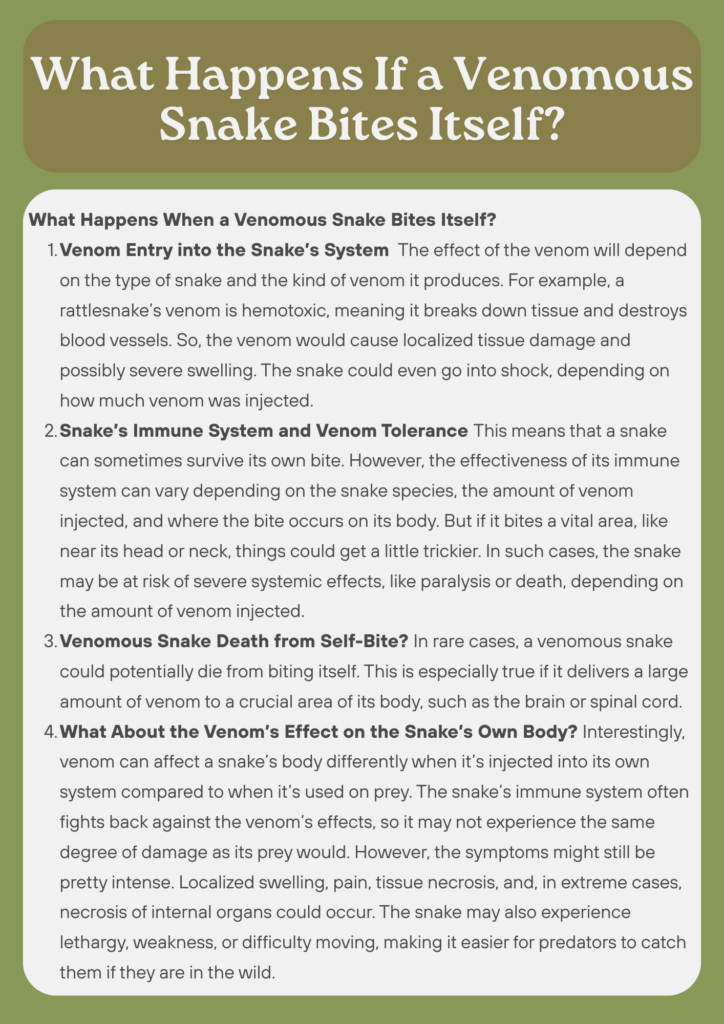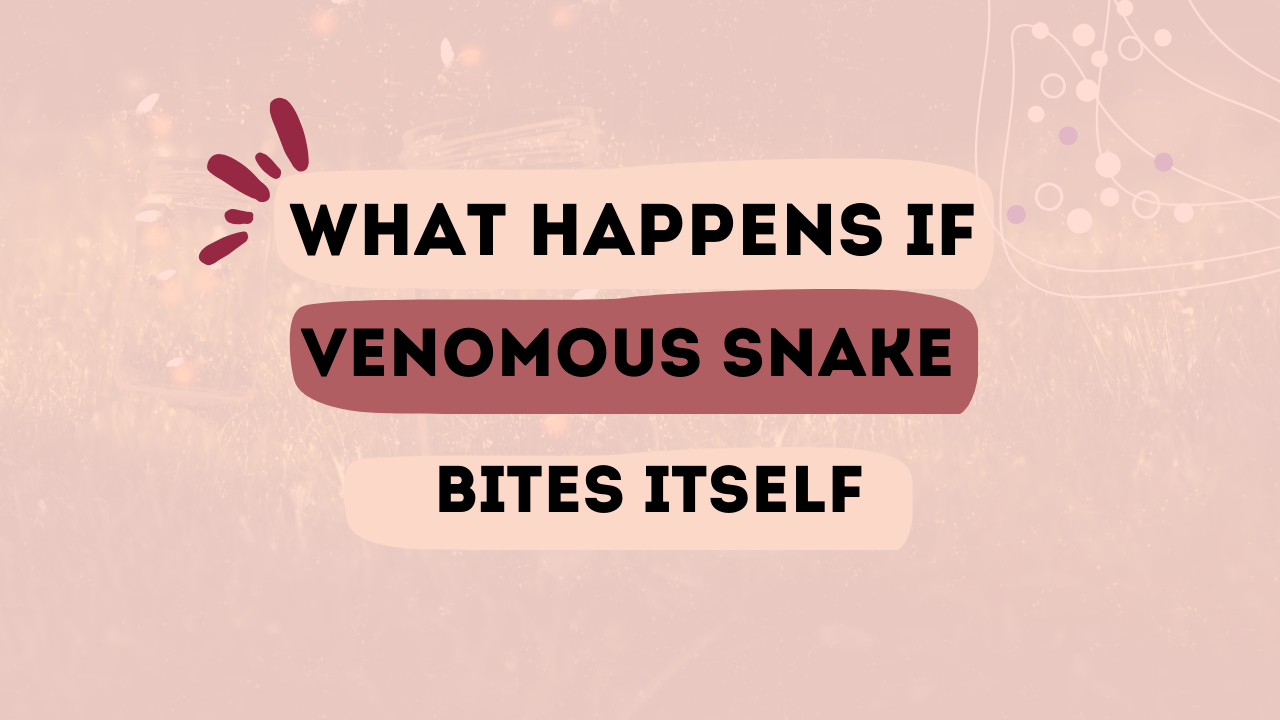When we think about venomous snakes, we often picture them striking at their prey, fangs sinking into soft flesh, and venom coursing through their victim’s bloodstream. But have you ever wondered what would happen if a venomous snake were to bite itself?
Sounds strange, right?
I mean, why would a snake ever bite itself? Well, turns out, there are a few scenarios where it could happen, and believe it or not, it can actually lead to some pretty interesting results.
In this article, we’re going to dive deep into what would occur if a venomous snake accidentally or intentionally bites itself and why these situations aren’t as simple as just “ouch!”
Table of Contents
We’ll also talk about what might happen to its own body and how its venom can play a role in this weird event. Trust me, you might not have thought about this before, but it’s definitely worth a closer look.
The Anatomy of Venomous Snakes and How Venom Works
Before we dive into the question of what happens when a venomous snake bites itself, it’s important to understand a little about venom and how it works. Venom is a complex mixture of proteins, enzymes, and toxins that snakes use to immobilize or kill their prey. Depending on the species, venom can cause paralysis, blood clotting, or tissue damage, which aids the snake in catching its food.
Now, it’s important to note that snakes have a very particular way of using their venom. Most venomous snakes have specialized fangs that are connected to venom glands. When they strike, these fangs pierce the skin of their prey, and the venom is injected into the body. The venom isn’t necessarily dangerous to the snake itself—usually, their immune systems are adapted to handle it. But what happens if the snake turns its fangs on itself? That’s a whole different story.
Can a Snake Accidentally Bite Itself?
Yes, it’s possible! While it may seem unlikely for a snake to bite itself, it can happen, especially in certain situations. One of the most common reasons a venomous snake might bite itself is during a defensive action or a state of stress. When snakes are threatened, they might become disoriented and lash out in all directions, sometimes inadvertently biting their own body. In fact, this can happen more easily than you might think when a snake is in a state of confusion or panic.
Snakes are not exactly known for their impeccable coordination (they are not trying to multitask like us humans), so it’s not too far-fetched for them to accidentally land a bite on themselves. In the wild, a snake might feel threatened by a predator or another snake, and it could instinctively react by striking out—unintentionally targeting itself. This is more likely in species like cobras or vipers, which can deliver venomous bites even when not aiming at a specific target.

What Happens When a Venomous Snake Bites Itself?
Okay, so we’ve established that a venomous snake can bite itself. But what happens next? Well, let’s break this down a little:
- Venom Entry into the Snake’s System When a venomous snake bites itself, the venom is injected into its own tissues, just like it would be when it strikes a prey animal. The effect of the venom will depend on the type of snake and the kind of venom it produces. For example, a rattlesnake’s venom is hemotoxic, meaning it breaks down tissue and destroys blood vessels. So, if a rattlesnake were to bite itself, the venom would cause localized tissue damage and possibly severe swelling. The snake could even go into shock, depending on how much venom was injected.
- Snake’s Immune System and Venom Tolerance Snakes have a special adaptation to avoid poisoning themselves. Their immune system is often capable of neutralizing the venom to some degree. This means that a snake can sometimes survive its own bite. However, the effectiveness of its immune system can vary depending on the snake species, the amount of venom injected, and where the bite occurs on its body. For example, if the snake bites itself on a limb or a part of its body that doesn’t have vital organs, it might be more likely to survive, albeit with some painful and swollen consequences. But if it bites a vital area, like near its head or neck, things could get a little trickier. In such cases, the snake may be at risk of severe systemic effects, like paralysis or death, depending on the amount of venom injected.
- Venomous Snake Death from Self-Bite? In rare cases, a venomous snake could potentially die from biting itself. This is especially true if it delivers a large amount of venom to a crucial area of its body, such as the brain or spinal cord. For example, cobras and vipers that inject neurotoxic venom might face issues such as paralysis of the respiratory system, which could lead to suffocation. However, these cases are very uncommon because snakes generally don’t bite themselves in a way that would be immediately fatal.
- What About the Venom’s Effect on the Snake’s Own Body? Interestingly, venom can affect a snake’s body differently when it’s injected into its own system compared to when it’s used on prey. The snake’s immune system often fights back against the venom’s effects, so it may not experience the same degree of damage as its prey would. However, the symptoms might still be pretty intense. Localized swelling, pain, tissue necrosis, and, in extreme cases, necrosis of internal organs could occur. The snake may also experience lethargy, weakness, or difficulty moving, making it easier for predators to catch them if they are in the wild.
Can Snakes Avoid Biting Themselves?
While it’s not something they do regularly, there are ways snakes avoid accidentally biting themselves. As cold-blooded creatures, snakes rely on instinct and their sensory abilities to navigate the world around them. They may not be able to control their strikes with as much precision as some other animals, but they do have ways of detecting their own bodies. This means they can often avoid biting themselves under normal circumstances, though, as mentioned before, stressful situations can mess with their coordination.
Conclusion
So, what happens if a venomous snake bites itself? Well, the short answer is that it’s not as simple as just “poisoning itself.” While snakes are generally immune to their own venom to some extent, it can still cause them harm.
Whether it’s tissue damage, swelling, or even potential death, the results of a snake biting itself can vary depending on the snake species, how much venom is injected, and where the bite occurs. But overall, it’s a pretty rare event that likely wouldn’t happen unless the snake was under stress or confused.
In the end, it’s kind of crazy to think about, but it’s also a reminder of just how uniquely adapted these creatures are. They can withstand venom that would kill most other animals, and they’ve got mechanisms in place to help them avoid getting hurt by their own dangerous bites. Pretty cool, right? Even if they do occasionally make a mistake and bite themselves, they’ve got ways of dealing with it that we probably couldn’t imagine.

